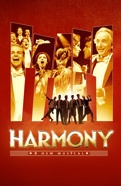Good Times and Bum Times: For Barry Manilow, Bruce Sussman and the Stars of Harmony, It's All a Blessing
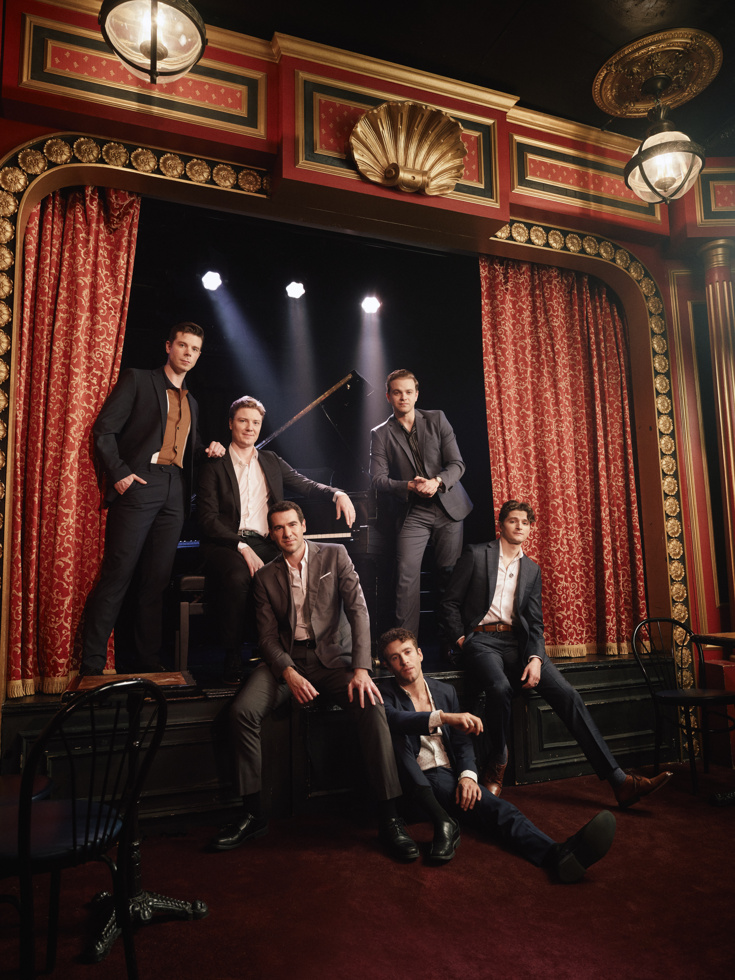
Zal Owen, Danny Kornfeld, Blake Roman and Steven Telsey
(Photo by Emilio Madrid for Broadway.com)
There’s a Hebrew phrase, Gam zu l'tovah. Roughly translated, it means, This, too, is for the best.
If Barry Manilow and Bruce Sussman—writers of the perpetually on-again-off-again musical Harmony—managed to sustain this philosophy of patience and trust through their show’s quarter-century of whiplash, they must have been down to their last crumbs of faith by the winter of 2019.
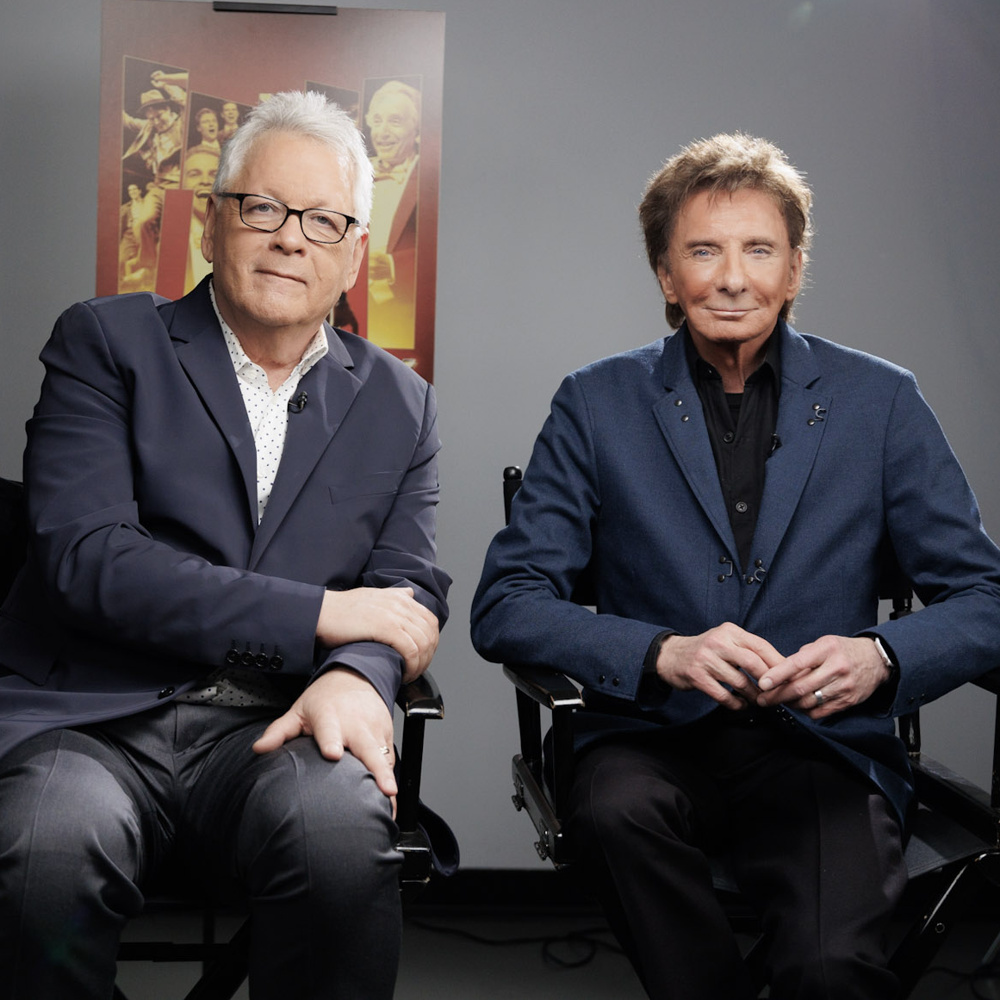
& Barry Manilow (Photo: Paul Aphisit)
Beginning Broadway previews at the Barrymore Theatre on October 18, Harmony tells the story of the Comedian Harmonists—a German singing group that gained global fame in the 1920s, but because of its Jewish members, was disbanded and erased from history by the Nazi regime. At an exclusive photo shoot for The Broadway Show, Manilow (best known as a hit-making singer-songwriter), Sussman (his longtime collaborator), and their six Broadway-bound crooners sat down with Broadway.com Editor-in-Chief Paul Wontorek to recount the show’s storied past.
Harmony debuted in 1997 at San Diego’s La Jolla Playhouse. Six years later, a cash flow problem abruptly ended a planned 2003 run at Philadelphia’s Forrest Theatre, as well as the 2004 Broadway debut that the Philly production was intended to cue up. The musical then re-emerged a decade later with a 2013 run at Atlanta’s Alliance Theatre, closely followed by a 2014 stint at the Ahmanson Theatre in Los Angeles.
"The reason why we didn't lose heart was that we just loved the piece."
–Bruce Sussman
"A lot of people don't understand this," says Sussman, mentally thumbing through all the times Harmony has changed hands. "When a producer signs a show, as long as they make a token option payment yearly, they can hold onto it for three years. So, we went through that four times. That's 12 years right there."
"And they kept saying, 'Oh no, we're gonna work on it,'" Manilow interjects, recalling those plodding years of development. "'No, we still love it, we're gonna work on it.'" "The reason why we didn't lose heart was that we just loved the piece," Sussman adds. "We thought, we want to do whatever we can so that someone goes to a theater and learns who the Comedian Harmonists were. And maybe remembers them."
Finally, in 2019, an off-Broadway run with the National Yiddish Theatre Folksbiene was on the books. The production was backed by prolific Broadway producer Ken Davenport, Tony-winning choreographer Warren Carlyle was at the helm and the show was set to open at the Museum of Jewish Heritage on March 11, 2020.
That’s when Carlyle’s appendix burst.
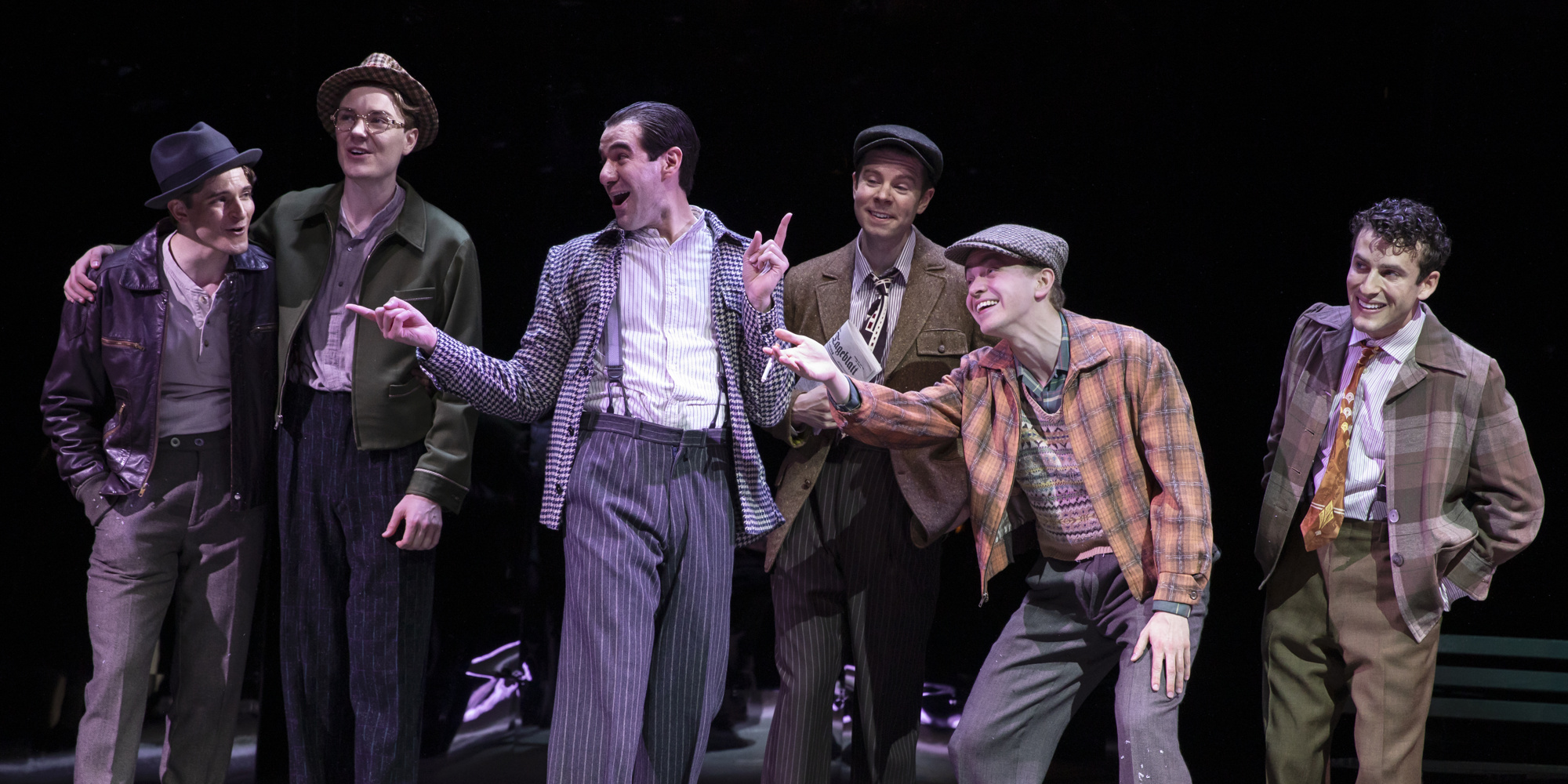
& Danny Kornfeld in "Harmony" off-Broadway (Photo: Julieta Cervantes)
On December 6, 2019, the production announced the postponement of Harmony’s off-Broadway premiere. The show would now open in March 2021—yet another disappointing delay.
Gam zu l'tovah.
"We were supposed to open at the National Yiddish Theatre on March 11, and the theater was shut down March 14," Sussman recalls, looking back on the start of what would be an 18-month pandemic shutdown. "Had we opened, we would have been up for three [performances] and down…That probably would have been the end of us."
A cruel twist of fate became a "blessing," as Manilow now describes it—and in more ways than one. "Would Chip have been in that?" asks Danny Kornfeld, one of the Broadway production’s six Comedian Harmonists as well as one of the five of them who will be making his Broadway debut. "No," Sussman replies. "It was our meeting during the pandemic that produced that rewrite." Kornfeld refers to veteran Broadway star Chip Zien, who narrates the show as an older version of the character Rabbi opposite Kornfeld who plays Young Rabbi.
In the version that would have premiered off-Broadway in spring 2020, Zien’s character did not exist.
"We met on Tuesdays and Fridays during the Covid years, and we went through the play word for word."
–Barry Manilow
"Warren and Bruce and I met on Tuesdays and Fridays during the Covid years, and we went through the play word for word," Manilow remembers. "We all decided that this may be the right thing to do, which is to add yet another character to this play: older Rabbi. And it felt good, but we had never seen it. We didn't know whether it was going to work or not."
"We were gonna find out in New York," says Sussman.
And so they did. Harmony finally opened off-Broadway at the Museum of Jewish Heritage in April 2022, and Zien’s character was the lynchpin the show needed. He added a poignant blend of whimsy and nostalgia, and set against the innocent enthusiasm of the young and hopeful sextet, delivered a brutal reminder of history’s stubborn immutability. On top of Zien’s award nominations, the show itself raked in accolades, with Drama Desk and Lucille Lortel Award nominations for Best Musical, and a Drama Desk Award win for Sussman’s book.
Watch the full video feature below!
Of course, there’s no Harmony without the Harmonists—and finding the right combination of six performers who are musical technicians and vaudevillian comics in equal measure was essential to the production’s success. Sussman, Manilow and Carlyle found their sextet off-Broadway in Sean Bell, Danny Kornfeld, Zal Owen, Eric Peters, Blake Roman and Steven Telsey, all of whom are moving with the show to Broadway (Owen is the only Harmonist who has performed on Broadway before).
"We've been working together for two years now—the six of us," says Owen, who plays the group’s architect and tenor buffo Harry Frommermann. "I think Warren Carlyle bringing that energy into the space—the specificity of his direction and choreography let us explore; let us try to find what is funny."
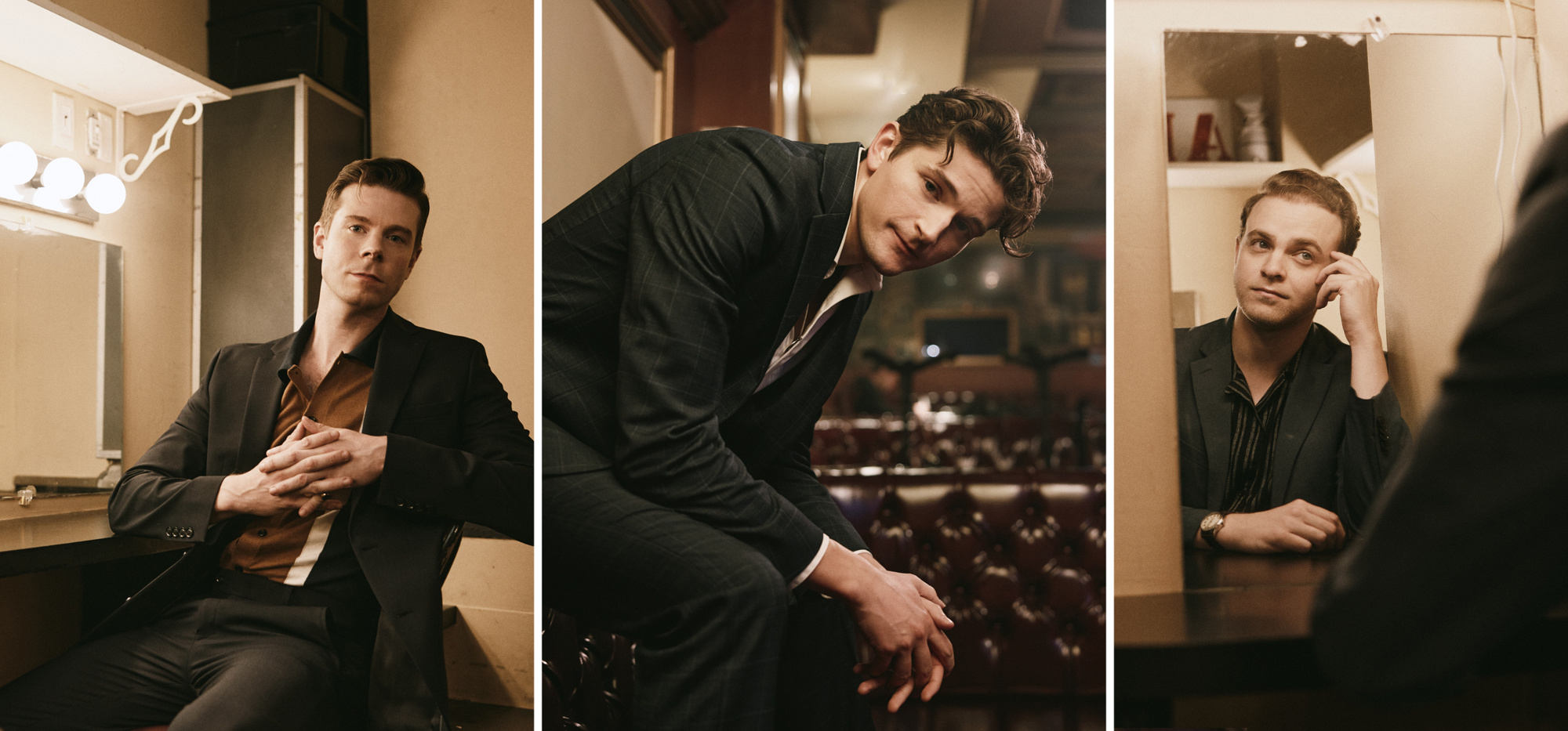
"We always say we were very well cast," says Bell, whose comic performance as bass Bobby Biberti has drawn comparisons to Danny Kaye. "We are very similar to our characters in a lot of ways."
That ensemble chemistry, like everything else in the world of Harmony, is both a blessing and a curse. "We know that if we lose the six of us, then we lose the show," says Kornfeld. "We've really made a commitment to one another." Roman, who plays a virtuosic Polish pianist aptly nicknamed Chopin, agrees. "It points to just how much weight one person in this group adds to the total dynamic." Telsey, however, jumps in to relieve a bit of the pressure, affirming that "the show still speaks to the volume that it speaks when one of us is out. It goes to show how great this piece of theater is." (Telsey takes on the role of Bulgarian tenor Ari "Lesh" Leschnikoff.)
"I think there's a real reason it's called Harmony," adds Peters, who plays second tenor and one of the group’s three Jewish members, Erich Collin. "So many different people from different walks of life with different experiences could come together and create something so beautiful and something that has lasted throughout the course of history—and now I think will forever with us telling this story."
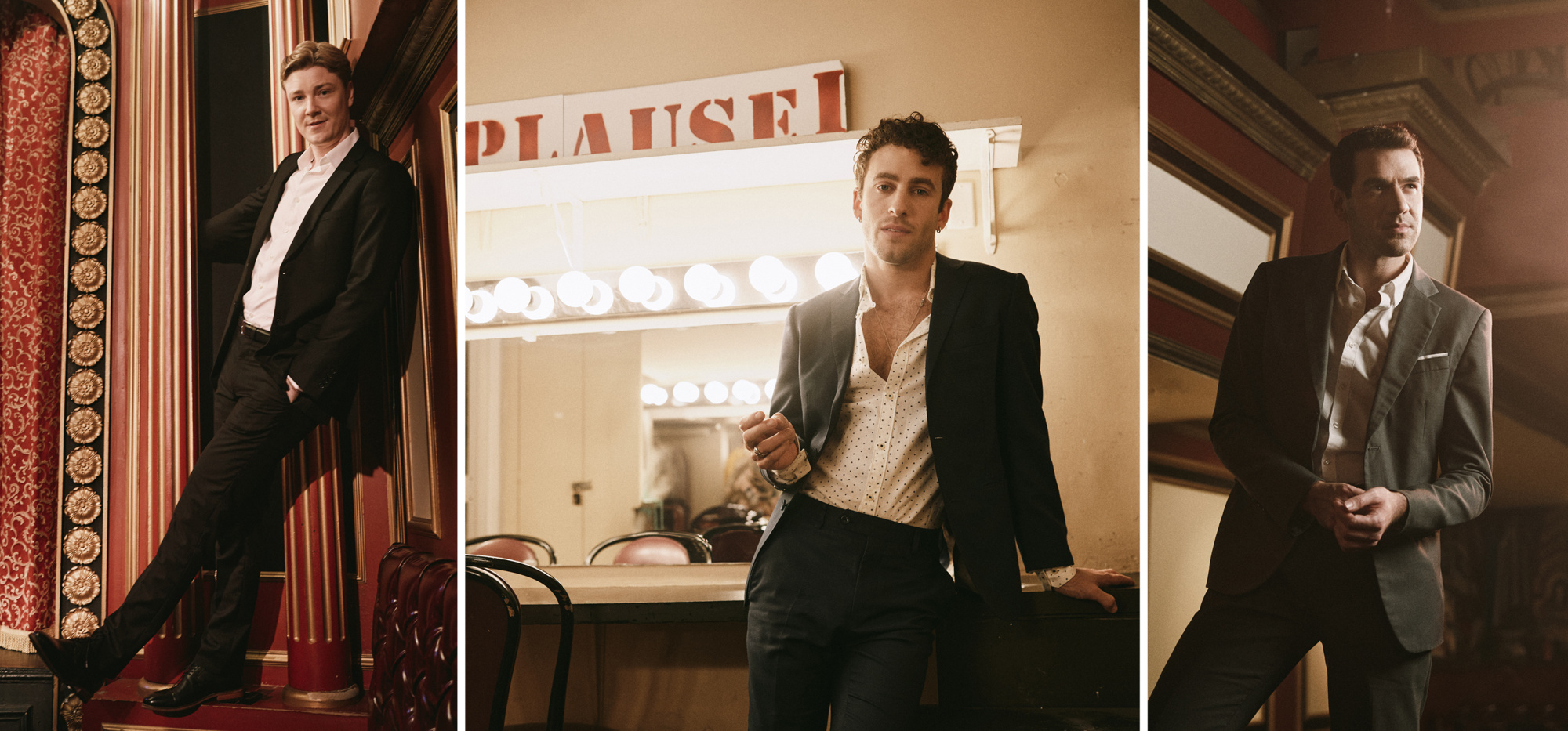
"The last lyrics of the show are now, ‘remember the stars, the stars in the night,'" says Sussman. "That's our appeal: Remember these guys. 'Cause they were really worth remembering."
With 26 years between the musical’s world premiere and its Broadway debut, the Harmony marquee on grand display down 47th Street, in many ways, is monument to a hard-won victory. But the company—Manilow in particular—refuses to give in to the spirit of celebration just yet: "Bruce calls me now and again, and I say, ‘OK, what happened? The theater burned down, right?'" It’s hard to deny the man his cautious optimism, especially considering that on the night of Harmony’s official New York premiere downtown, Manilow tested positive for Covid. "Is that a cruel joke or what?" he says, still flabbergasted by the cosmic prank.
And yet, if all holds steady, on November 13, Manilow will get to have his first real celebration with this special assemblage of cast and creative team members at Harmony’s Broadway opening—a moment nearly three decades in the making. Gam zu l'tovah.
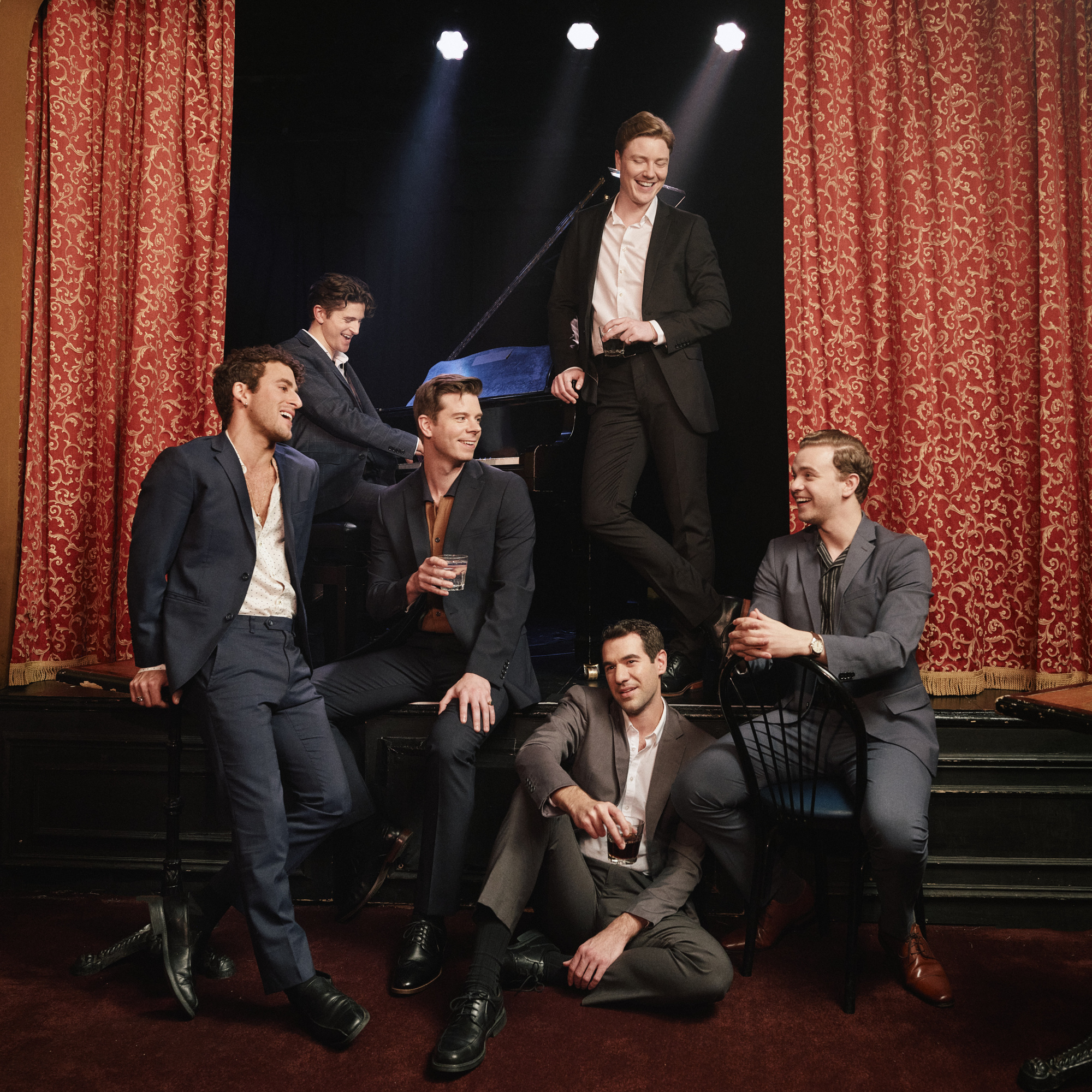
Zal Owen, Eric Peters & Steven Telsey
Produced for THE BROADWAY SHOW by Paul Wontorek, Caitlin Moynihan and Lindsey Sullivan | Shot at The Triad Theater in NYC | Photos by Emilio Madrid | Photo Assistants: Alan Padilla and Cooper Hammel | Directors: Nick Shakra and Zack R. Smith | Video: Born in Brooklyn: Luis Ferrá and Shaun Copeland | Audio: Anton Ponomarev | Grooming: Angella Valentine and Eldo Ray Estes
